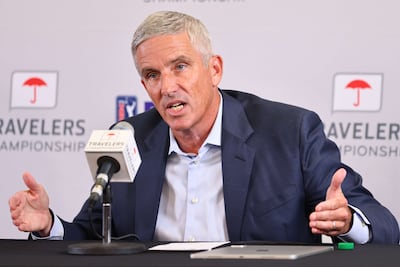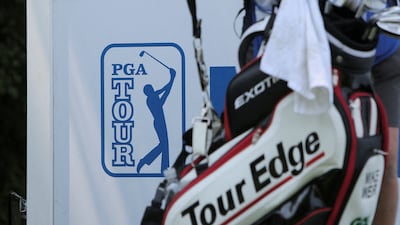Professional sport in the US is steeped in politics and regulatory hurdles, but the proposed PGA-LIV Golf merger faces a different set of circumstances than in decades past.
The PGA and LIV merger ended a turbulent year in professional golf that split professional golfers into rival camps.
The proposed combining of the two leagues would be the latest high-profile sporting tie-up in a country where the major sporting leagues – the NFL, NBA, MLB and NHL – are all the products of mergers.
On Tuesday, senators will grill PGA executives and argue that the proposed deal violates anti-competition laws in the US, known as antitrust laws.
“Significantly, the deal appears to have a substantial adverse impact on competition, violating several provisions of US antitrust law, regardless of whether the deal is structured as a merger or some sort of joint venture,” wrote senators Elizabeth Warren and Ron Wyden.
How have US sports leagues merged before?
Rival leagues were commonplace as sports grew in popularity in the US.
Professional baseball was the first to face duelling leagues in the 19th century. In 1902, the National League and American League called a truce and united under one league, Major League Baseball, sealing their newfound co-operation with a championship game called the World Series in 1903.
The world's richest professional sports league – the National Football League – was born from a merger in the mid-1900s. Facing stiff competition from the American Football League and its rich owners, the NFL eventually negotiated a merger that would lead to the creation of the modern-day league and the Super Bowl.
After a delay due to an antitrust lawsuit, basketball soon followed with the creation of the NBA. Ice hockey became the final sport to undergo a similar process with the conclusion of the 1979 NHL expansion.
All four sports leagues have had legal battles involving the application of antitrust laws.
How might the PGA-LIV deal violate antitrust law?
Any antitrust arguments would be rooted in two laws that date back to the late 1800s.
The Sherman Act prohibits any contract, conspiracy or combination of business dealings that would restrain foreign or US interstate trade. Passed in 1890, it was aimed at “preserving free and unfettered competition as the rule of trade”.
The Sherman Antitrust Act was later codified by the Clayton Act, which strengthened the former by outlawing any mergers or acquisitions that may lessen competition.
PGA Commissioner Jay Monahan may have tipped his hand when he suggested the proposed deal was an opportunity to “take the competitor off the board”.

As part of the deal, the competing tours drop their lawsuits against each other. The agreement also includes the PGA European Tour.
Mr Monahan said the deal must be approved by the PGA Tour policy board.
How is the Justice Department involved?
One of Washington's two antitrust enforcers, the Justice Department, is already investigating the proposed deal.
Even before the proposal was announced, federal prosecutors were investigating the PGA Tour over potential anticompetitive behaviour.
The Justice Department this year has already been successful in suing to break up an alliance between JetBlue Airways and American Airlines over their partnership on north-eastern routes.
Federal prosecutors have also sued to block JetBlue's $3.8 billion acquisition of Spirit Airlines. Attorney General Merrick Garland previously said such a move would harm consumers who may faced rising ticketing costs.
Ms Warren and Mr Ryden have both asked the Justice Department to investigate the proposed PGA-LIV deal.
Senator Richard Blumenthal has also opened an investigation into the leagues' agreement, requesting records from both tours.
In letters addressed to Mr Monahan and LIV chief executive Gren Norman, Mr Blumenthal said the deal raises serious questions regarding the “reasons for and terms behind the announced agreement”.


